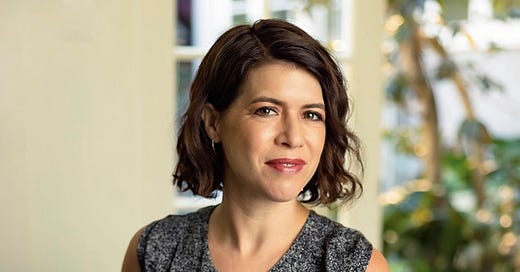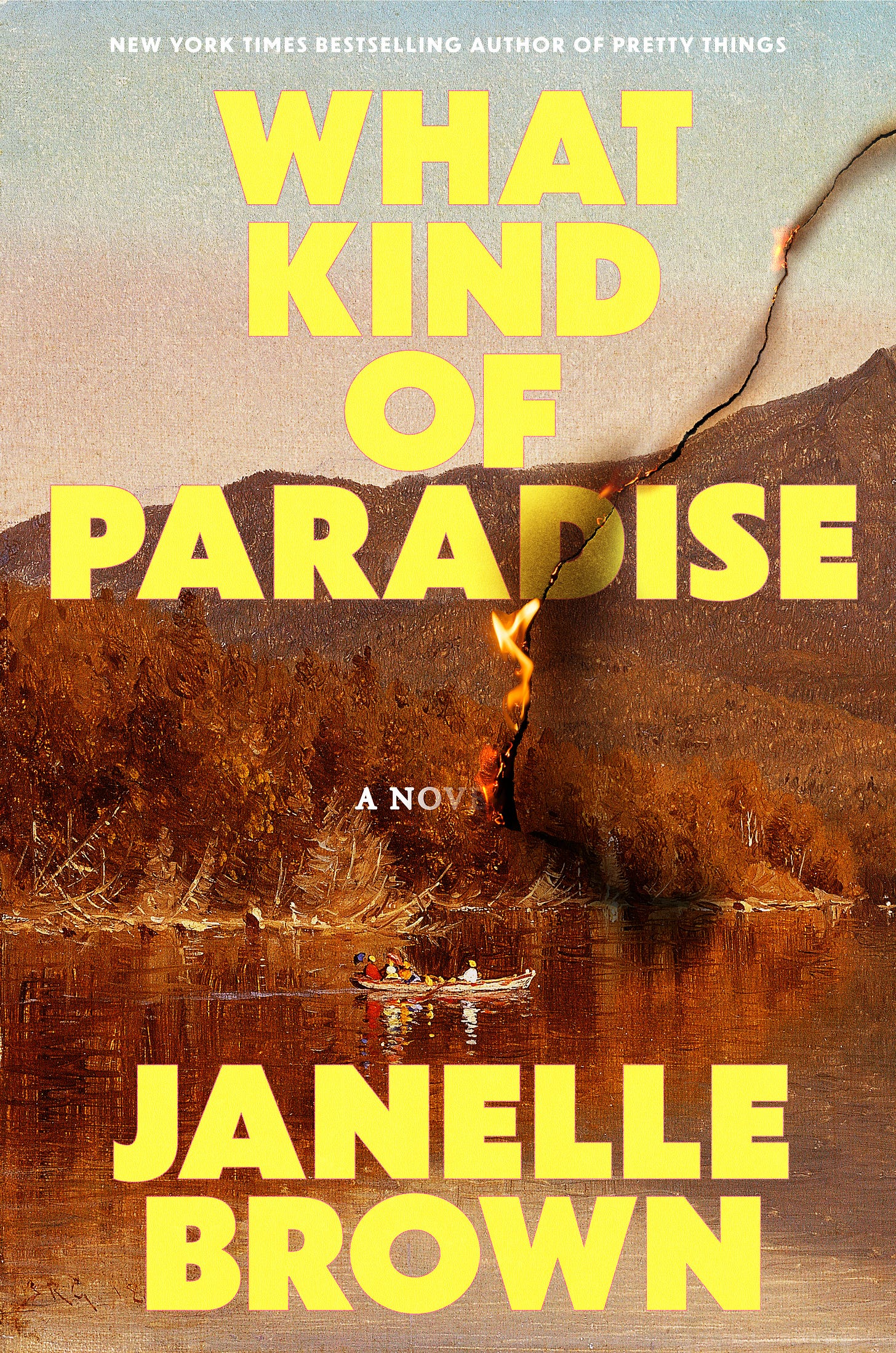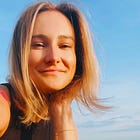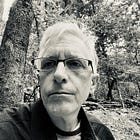CR 049: Janelle Brown on the Unabomber, AI, and Her Love for Dysfunctional Families
The former Wired journalist discusses her newest novel, “What Kind of Paradise.”
Janelle Brown began her career as a journalist for Wired during the height of the ’90s-era dot-com boom, and in the years since has written personal essays, book reviews, and articles for The New York Times, Vogue, and ELLE, among others. In 2008, her debut novel, All We Ever Wanted Was Everything, became a New York Times bestseller and was named the Best Book of 2008 by Library Journal, which called it a “quintessential summer read.” She has since published five additional novels, each of them landing on many bestseller and “best of” lists.
But it’s her latest, What Kind of Paradise, that Brown says is her most personal. Taking place in the 1990s, the novel follows Jane, a teenager who lives a sheltered existence with her technology-averse father Saul in an isolated cabin in Montana. As the outside world adapts to the new digital age, Jane—who has consistently been warned by her father about the dangers of the internet—begins to pick up clues that what she’s been told about herself, her childhood, and her mother’s mysterious death may not be true. When she unintentionally assists her father in committing a horrific crime, she flees to the Bay Area, where her mother supposedly died, in the hopes of discovering the truth about her life. A coming-of-age story set against the earliest days of the internet, it’s already been called one of the summer’s best beach reads by the New York Times.
I recently spoke with Brown about the writing of the novel, the inspiration for the character Saul, and the state of journalism in our AI-obsessed world.
This content contains affiliate links. I am an affiliate of Bookshop.org and I will earn a commission if you click through and make a purchase.
SANDRA EBEJER: I read a quote of yours where you said, “My books tend to be page-turners with dysfunctional family relationships at their hearts.” That absolutely describes your latest novel. What is it about dysfunctional families that you find so interesting?
JANELLE BROWN: I mean, they’re way more interesting than a functional family, right? [Laughs]
If those exist.
Yeah. I mean, most of our personal growth as humans is how we escape from the dysfunction that we’re raised in. Legacy is a theme that I like to explore, inheritance, all these things. You’re raised in a unit, and you can’t help but absorb all of the dysfunction around you. And the question is, how do you process that and move through your life? And what bad decisions it makes you make, and what good ones you are able to come to after that.
How did What Kind of Paradise come about?
It stems from my time working in the dot-com boom years in San Francisco, back in ’95, ’96, ’97 through the early 2000s. So, in a way, I’ve been percolating on this for 30 years. As someone who wrote about technology and was deeply immersed in that world for a long time, and as the years have progressed, I think there's been a real reckoning about what the internet age has brought us. Obviously, there’s many good things, but probably an equal number of bad. I’ve wrestled with my own feelings of culpability, of having been a booster of the internet early on, a naive “Rah, rah, rah! The technology is going to make everything fantastic! No regulation, no government oversight! Let’s let technology go wild!” And now all these years later, I’m like, “Oh my god. What hath we wrought?” [Laughs]
So it’s something I’ve been thinking about for many years. I wanted to write it and I was never quite sure how to do it. And then, after a conversation with someone, I was like, “I really should try writing a novel set in the past. I’m further away from it now that maybe I could re-explore those years from the perspective of now, and what hindsight we have now about what happened then.” That, combined with, I’d listened to a podcast about the Unabomber that came out four or so years ago—I was reopening that whole era, remembering and realizing that the dot-com boom and the Unabomber were in opposition to each other. That all started to percolate. And I just like coming-of-age stories and I had this idea about this girl who was growing up in this environment where her father is very much a Unabomber-like character and what that might be like. Suddenly, the book coalesced.
The character Saul is interesting. On one hand, it’s easy to dismiss him as some out-of-touch Luddite, but on the other hand, some of what he says isn’t far off when you think about where we are with AI today—especially given that your novels have been used without your permission to train Meta’s AI system. How was it to develop him as a character?
Writing the character Saul allowed me to really dig into my mixed feelings about technology. And yeah, certainly the AI age has brought a lot of incredibly alarming things, even though it’s also brought some really amazing things. My daughter had a final today and last night she used AI to create a podcast of all of her study notes to read out loud to her. And that was incredible. It was really helpful.
The flip side is, AI is taking my books and regurgitating them so that people can write their own. And that’s awful. Entire industries are just going to vanish because AI is taking graphic design and entry level positions and all kinds of stuff. I’ve been thinking about that a lot. I’ve been following AI pretty closely for the past couple years. So, Saul was my way into tearing apart all those feelings and the worries and concerns that I have.
I also spent a lot of time with the Unabomber’s writings, and, yeah, he had a lot of very prescient observations. He was also completely insane. If you read his manifesto, for every line where you’re like, “Oh, wow, that’s kind of dead on,” there’s another one where you're like, “Wow, you’re an awful human being.” [Laughs] It makes him a very interesting character. I wanted to tease that out in Saul, and make him more approachable and less straight-up insane than the Unabomber was. But I took pieces of the Unabomber, for sure.
On the flip side there’s Saul’s daughter, Jane. As a reader, your heart breaks for her because she’s this kid who was completely let down by her parents and then forced to grow up very quickly after having spent most of her life living off the grid. How was it to take her through this journey as she discovers not only who her parents really are but what exists out in the world?
It was a challenge to write a completely naive character, someone who has basically been completely sheltered from the world. It was a fine balance, because it would have been very easy to take her out of her totally naive world and then throw her into San Francisco and have every sentence be like, “I couldn't believe this! I couldn't believe that! I got this wrong! I got this wrong! I got this wrong!” That wasn't the book I wanted to write. Obviously part of her journey was getting exposed to pop culture and modern living and the way people act, what relationships are like, and all those kinds of things. But I didn’t want it to be the only thing. So it was a balance to figure out what were the most important things to explore.
I did decide to have her have some exposure to the outside world when she’s in her cabin. She does go into Bozeman sometimes. She does read newspapers and magazines. She does sneak in a little bit of television. So she’s not starting at zero, which helped. But, yeah, there’s a big arc and it was fun to write this coming-of-age story where it's really coming of age. You’re not just coming of age as coming from childhood to adulthood, but from complete naivete to worldliness.
There’s a lot in the book about technology, living off the grid in Montana, and a character who loves to reference Marxist philosophy. At one point, I was wondering if you’d grown up in Montana, because you write about it so realistically. How much research did you have to do in order to write these aspects of the story?
We did not live in Montana, but my family did have a cabin that they built out there when I was in my twenties. In the ’90s, I was spending vacations out in Montana quite a bit. So I had some familiarity with it already, specifically the Bozeman area, which is why I set it there. But yeah, I did have to do quite a bit of research. It’s a lot of spending time in archives trying to figure out what the Bozeman library looked like in 1993 and things like that. And living off the grid, that’s not something I’ve personally done, so I had to do a lot of research into that, like what it takes, what it might be like. I’m sure I got things wrong and a true survivalist would be like, “No!” [Laughs] But that was the trickiest part of [the book].
When it comes to research, do you try to do it all before you begin writing? Or do you write and stop to do research along the way?
I research along the way. I mean, I'll do some general research [in advance]. For example, with this, I knew I had to do a lot of research into the Unabomber and I did that right away at the beginning. But then as I went, I’d be like, “I really need to learn more about what it means to build a solar water heater.” Or, “What were people listening to in the ’90s? What was the popular music?” That kind of stuff. But the big ones about character I research in the beginning as much as I can, then it’s an ongoing process as I go.
You shared in the acknowledgements that this book was written over the course of two writing retreats. What is your writing process? Are you a plotter? Pantser?
It was bookended by the writing retreats. I find writing retreats very helpful for jump-starting a book, like when I’m just sitting down and really getting into it and getting focused, and then also finishing a book. I find that when I go away for a week and just immerse myself in a book, that’s really, really helpful. But in between, I have an office that I go work at every day. It’s a collective space for writers that I started with a friend. I go there every day and work. And I would say that I work in waves. Sometimes I am writing really intensely, and sometimes months go by when I have barely gotten a word on the page and I’m just sitting with ideas and trying to think how things go. I’m not a heavy plotter. I feel things out as I go. I do some rough outlines, but not heavily detailed ones.
You started out as a journalist. Obviously, the field has completely changed since you began your career. Do you feel as though there’s still a career to be had in journalism?
Oh, man, it’s rough. I would never advise someone to go into journalism these days. I feel very lucky that I got out of it when I did and that the career path I chose has worked out for me. I mean, it’s a brutal, brutal industry right now. That’s one of the things that technology has not done well for us is [keep] journalism alive. I think it’s really important that we have unbiased news outlets that are out there trying to disseminate information in a broad way. And instead, we’re resorting to this algorithm-based influencer news, which has absolutely no expertise to it whatsoever. Kids are getting their information from TikTok. That’s why you have the rise of these extreme points of view and radical belief systems, because the information that people are getting is not neutral anymore. It’s pretty dark. So, yeah, I have a deep ambivalence about technology when it comes to journalism, for sure.
Who are some of your influences? Who or what do you turn to when you need a dose of inspiration?
I have authors that I go to. I’ll pick up their books whenever I feel lost. Donna Tartt I turn to a lot. Barbara Kingsolver. Gillian Flynn for plotting. She’s so good at plotting. I go to Jonathan Franzen a lot. I’ll pick up [their books] and be like, “Look at this master of the art and the craft. How did they craft this paragraph, this sentence, this section, this chapter?” It helps me sometimes to get into my own writing.
Your work has appeared on the New York Times bestseller list, which I imagine can be both wonderful and daunting as an author. Is it difficult to write the book you want to write without worrying about external validation? Do you feel pressure to make every novel a huge bestseller?
I don’t think about that at all when I’m writing. It’s not a factor in the things that I write about or the way I write them. I mean, I will fret about it after the book is done. [Laughs] I’ll be like, “Oh, God, what have I written? I hope people like it!” But I never in my life have thought, “What’s popular right now? What can I write to please that market?” I think that’s a fool’s game. Everyone who’s currently frantically trying to write romantasy because romantasy is so popular, by the time their books come out, everyone’s going to have moved on to something else. It’s just pointless. Everyone was trying to imitate Colleen Hoover two years ago and now, if you had a book that came out that was like Colleen Hoover, they’d be like, “Well, that’s done.” So, there’s no point in doing that.
What advice would you have for aspiring novelists?
My usual piece of advice to writers is to find a writing group, a feedback situation where you’re beholden to some people, especially when you're trying to get going. They’re expecting you to turn pages in, they give you feedback, you can talk through your stuff as you’re writing it. I think writing in a vacuum is a really dangerous thing to do when you're first starting. It’s just hard. You have no idea what you’re doing, and having a writer’s group of some sort, working in a workshop, or having a teacher is really, really helpful. Otherwise it’s very easy to get stuck in your own head and not really know what to do. I found it very, very critical for me in my first couple of books to have something like that.
To learn more about Janelle Brown, visit her website.
To purchase What Kind of Paradise, click here.
This interview has been edited for clarity and length.
You might also enjoy…









